孔子与苏格拉底生平
试比较孔子与苏格拉底教育思想的异同
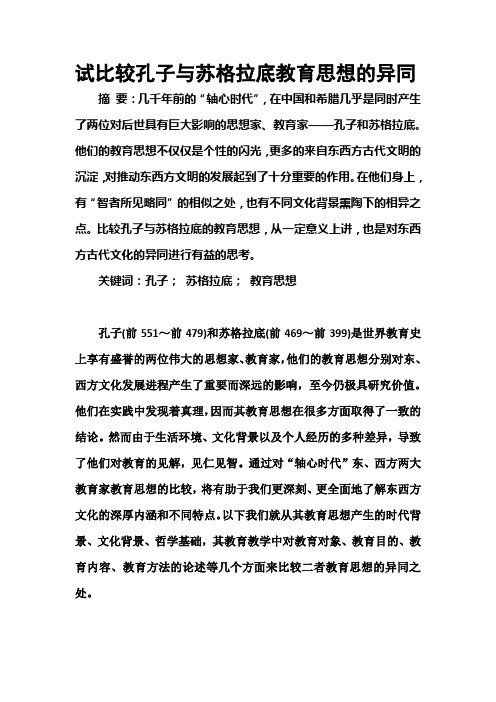
试比较孔子与苏格拉底教育思想的异同摘要:几千年前的“轴心时代”,在中国和希腊几乎是同时产生了两位对后世具有巨大影响的思想家、教育家——孔子和苏格拉底。
他们的教育思想不仅仅是个性的闪光,更多的来自东西方古代文明的沉淀,对推动东西方文明的发展起到了十分重要的作用。
在他们身上,有“智者所见略同”的相似之处,也有不同文化背景熏陶下的相异之点。
比较孔子与苏格拉底的教育思想,从一定意义上讲,也是对东西方古代文化的异同进行有益的思考。
关键词:孔子;苏格拉底;教育思想孔子(前551~前479)和苏格拉底(前469~前399)是世界教育史上享有盛誉的两位伟大的思想家、教育家,他们的教育思想分别对东、西方文化发展进程产生了重要而深远的影响,至今仍极具研究价值。
他们在实践中发现着真理,因而其教育思想在很多方面取得了一致的结论。
然而由于生活环境、文化背景以及个人经历的多种差异,导致了他们对教育的见解,见仁见智。
通过对“轴心时代”东、西方两大教育家教育思想的比较,将有助于我们更深刻、更全面地了解东西方文化的深厚内涵和不同特点。
以下我们就从其教育思想产生的时代背景、文化背景、哲学基础,其教育教学中对教育对象、教育目的、教育内容、教育方法的论述等几个方面来比较二者教育思想的异同之处。
一、思想背景1.不同的时代背景孔子所生活的年代,正处于“礼崩乐坏”、“世衰道微”的春秋中晚期。
社会动荡、王权衰落,礼乐征战自诸侯出,自大夫出,争霸战争此起彼伏,新兴地主阶级迅速崛起,使建立在宗法制基础上的周礼名存实亡。
在这场剧烈的社会变革中,作为统治基础力量的士阶层成为统治阶级竞相争夺的对象,养士之风日盛,在士阶层的推动下,出现了百家争鸣、思想大解放的新局面。
孔子就是“士”阶层的典型代表,他有宏伟的政治抱负:希望用恢复周礼的典章制度来挽救四分五裂的“周室”,希望通过参政拯救黎民,力挽狂澜。
他甚至作出承诺:“苟有用我者,期月而已可也,三年有成。
”①但因为当时把持政权的是“斗筲之人”,所以孔子虽有过短暂的从政机会,但终究无法充分施展自己的政治抱负。
历史长河中的杰出教育家

历史长河中的杰出教育家教育是人类社会进步的重要基石,而杰出的教育家则是推动教育事业发展的重要力量。
他们在历史长河中留下了深远的影响,为后世教育家提供了宝贵的经验和启示。
本文将介绍几位历史上的杰出教育家,探讨他们的贡献以及教育理念的传承。
第一部分:孔子——儒家教育思想的奠基者孔子是中国古代的伟大教育家之一。
他生活在公元前551年至前479年,被誉为儒家教育思想的奠基者。
孔子强调教育的重要性,他的教育理念主要包括“以德育人”和“教学相长”。
孔子主张以品德教育为基础,通过教人做一个有道德修养的人,从而塑造一个良好的社会。
他提倡“学而优则仕”,认为通过学习来提升个人修养和能力,进而为社会做出更大的贡献。
孔子的教育思想强调师生互动,强调学生通过与老师的交流和讨论来提升自己的学识和智慧。
这种教学模式倡导了一种积极向上的学习氛围,对后世教育家的教育方法产生了深远的影响。
第二部分:苏格拉底——启蒙教育的倡导者苏格拉底是古希腊的一位伟大哲学家和教育家。
他生活在公元前469年至前399年。
苏格拉底的教育思想强调启蒙教育和批判性思维。
苏格拉底认为,教育的目标是唤醒学生内在的智慧,使其通过自我思考和探索来获得真理。
他拒绝简单地传授知识,而是通过提问和引导学生思考,使其逐渐形成独立思考和判断的能力。
苏格拉底的教育方法被称为“苏格拉底式讨论法”,即通过对话和讨论的方式引导学生思考,激发他们的批判性思维和辩证能力。
这种启蒙教育的思想对于后世的教育领域有着深远的影响。
第三部分:约翰·杜威——进步教育的倡导者约翰·杜威是20世纪美国的一位杰出教育家和哲学家。
他生活在1859年至1952年期间,被誉为进步教育的倡导者。
杜威主张以经验为基础的教育,强调学生主动参与和实践的重要性。
他认为学生应该通过与周围环境的互动和实际体验来获得知识和技能,并将其应用于实际生活中。
杜威提出了“学以致用”和“学以自由”两个重要理念。
孔子遇上苏格拉底的故事

孔子遇上苏格拉底的故事孔子和苏格拉底是古代两位伟大的哲学家和思想家,他们分别代表了中国和希腊哲学的巅峰。
虽然他们生活在不同的时代和地域,但如果他们有机会相遇,他们之间一定会有一场精彩的对话。
故事开始于一个遥远的时代,在古代中国的鲁国,孔子正在向他的学生传授他的思想。
他以仁爱、礼仪和道德为核心的教育方法吸引了许多学生和追随者。
在希腊,苏格拉底也以他的批判性思维和对真理的追求而闻名。
他常常与人们辩论,提出问题,以此推动他们思考和发现真相。
一天,孔子听说了希腊有一位同样伟大的哲学家苏格拉底,他也是一个深思熟虑的人,于是他决定去见见这位风格迥异的哲学家。
孔子和他的学生们踏上了一次漫长的旅程,穿越了山脉和河流,最终来到了希腊安第斯山脉的脚下。
当孔子到达雅典,他立即受到了苏格拉底的欢迎。
孔子和苏格拉底开始了一场激动人心的对话,他们交流了各自的思想和理念。
孔子向苏格拉底介绍了他的仁爱和礼仪的观念,强调了人与人之间的互动和互助的重要性。
苏格拉底则分享了他的批判性思维和对道德真相的追求。
在对话中,孔子和苏格拉底发现了许多共同点。
他们都认为人类的本质是善良的,只是因为各种外在因素才会使他们迷失方向。
他们都强调了道德的重要性,认为一个人只有通过修养自己的品德才能达到真正的幸福。
然而,孔子和苏格拉底的思想也存在一些不同之处。
孔子注重家庭和社会的和谐,认为个人的幸福与社会的稳定息息相关。
而苏格拉底则更加关注个体的内心世界和自身的认知能力,他相信通过思考和自省能够找到真理。
在他们分别阐述各自观点的同时,两位哲学家也互相提出了问题,迫使对方深入思考和解答。
他们的对话不仅让他们自己受益,也启发了他们的学生和追随者。
最终,孔子和苏格拉底结束了他们的对话,但他们的思想和理念将永远留在人们的心中。
他们的相遇不仅代表了两个伟大文化的交融,也展示了哲学的力量和智慧的传承。
这个故事告诉我们,即使来自不同国家和文化,不同的思想家和哲学家之间仍然可以有一场深入的对话。
孔子和苏格拉底教学法的比较
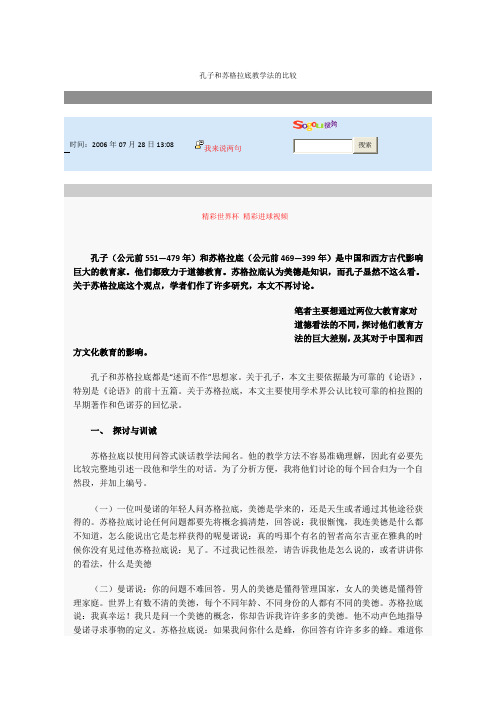
孔子和苏格拉底教学法的比较时间:2006年07月28日13:08 我来说两句搜索精彩世界杯精彩进球视频孔子(公元前551—479年)和苏格拉底(公元前469—399年)是中国和西方古代影响巨大的教育家。
他们都致力于道德教育。
苏格拉底认为美德是知识,而孔子显然不这么看。
关于苏格拉底这个观点,学者们作了许多研究,本文不再讨论。
笔者主要想通过两位大教育家对道德看法的不同,探讨他们教育方法的巨大差别,及其对于中国和西方文化教育的影响。
孔子和苏格拉底都是“述而不作”思想家。
关于孔子,本文主要依据最为可靠的《论语》,特别是《论语》的前十五篇。
关于苏格拉底,本文主要使用学术界公认比较可靠的柏拉图的早期著作和色诺芬的回忆录。
一、探讨与训诫苏格拉底以使用问答式谈话教学法闻名。
他的教学方法不容易准确理解,因此有必要先比较完整地引述一段他和学生的对话。
为了分析方便,我将他们讨论的每个回合归为一个自然段,并加上编号。
(一)一位叫曼诺的年轻人问苏格拉底,美德是学来的,还是天生或者通过其他途径获得的。
苏格拉底讨论任何问题都要先将概念搞清楚,回答说:我很惭愧,我连美德是什么都不知道,怎么能说出它是怎样获得的呢曼诺说:真的吗那个有名的智者高尔吉亚在雅典的时候你没有见过他苏格拉底说:见了。
不过我记性很差,请告诉我他是怎么说的,或者讲讲你的看法,什么是美德(二)曼诺说:你的问题不难回答。
男人的美德是懂得管理国家,女人的美德是懂得管理家庭。
世界上有数不清的美德,每个不同年龄、不同身份的人都有不同的美德。
苏格拉底说:我真幸运!我只是问一个美德的概念,你却告诉我许许多多的美德。
他不动声色地指导曼诺寻求事物的定义。
苏格拉底说:如果我问你什么是蜂,你回答有许许多多的蜂。
难道你不认为作为蜂它们是一样的,区别在于其他方面,例如外貌和个头等等曼诺说:是的。
苏格拉底进一步提示:如果没有节制和正义,能不能把国家和家庭管好曼诺说:不能。
苏格拉底又问:如果不节制、不正义,一个青年或一个老人能不能成为善良的人曼诺回答:当然不能。
古代著名教育家——孔子与苏格拉底
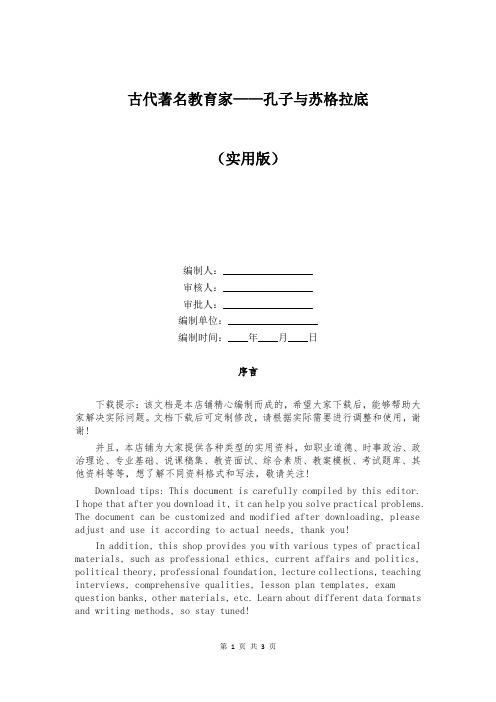
古代著名教育家——孔子与苏格拉底(实用版)编制人:__________________审核人:__________________审批人:__________________编制单位:__________________编制时间:____年____月____日序言下载提示:该文档是本店铺精心编制而成的,希望大家下载后,能够帮助大家解决实际问题。
文档下载后可定制修改,请根据实际需要进行调整和使用,谢谢!并且,本店铺为大家提供各种类型的实用资料,如职业道德、时事政治、政治理论、专业基础、说课稿集、教资面试、综合素质、教案模板、考试题库、其他资料等等,想了解不同资料格式和写法,敬请关注!Download tips: This document is carefully compiled by this editor.I hope that after you download it, it can help you solve practical problems. The document can be customized and modified after downloading, please adjust and use it according to actual needs, thank you!In addition, this shop provides you with various types of practical materials, such as professional ethics, current affairs and politics, political theory, professional foundation, lecture collections, teaching interviews, comprehensive qualities, lesson plan templates, exam question banks, other materials, etc. Learn about different data formats and writing methods, so stay tuned!古代著名教育家——孔子与苏格拉底中小学教师职业道德规范教师招聘考试试题及答案苏格拉底与孔子分别是古代西方与东方思想史上最有名望、最有声誉的代表人物之一。
孔子与苏格拉底
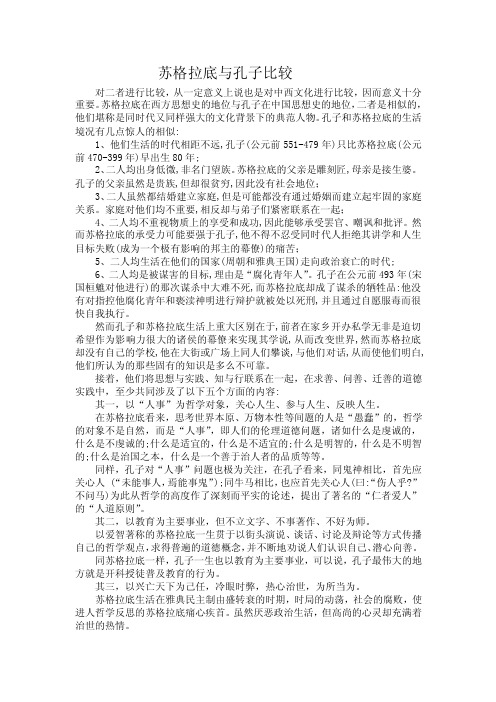
苏格拉底与孔子比较对二者进行比较,从一定意义上说也是对中西文化进行比较,因而意义十分重要。
苏格拉底在西方思想史的地位与孔子在中国思想史的地位,二者是相似的,他们堪称是同时代又同样强大的文化背景下的典范人物。
孔子和苏格拉底的生活境况有几点惊人的相似:1、他们生活的时代相距不远,孔子(公元前551-479年)只比苏格拉底(公元前470-399年)早出生80年;2、二人均出身低微,非名门望族。
苏格拉底的父亲是雕刻匠,母亲是接生婆。
孔子的父亲虽然是贵族,但却很贫穷,因此没有社会地位;3、二人虽然都结婚建立家庭,但是可能都没有通过婚姻而建立起牢固的家庭关系。
家庭对他们均不重要,相反却与弟子们紧密联系在一起;4、二人均不重视物质上的享受和成功,因此能够承受罢官、嘲讽和批评。
然而苏格拉底的承受力可能要强于孔子,他不得不忍受同时代人拒绝其讲学和人生目标失败(成为一个极有影响的邦主的幕僚)的痛苦;5、二人均生活在他们的国家(周朝和雅典王国)走向政治衰亡的时代;6、二人均是被谋害的目标,理由是“腐化青年人”。
孔子在公元前493年(宋国桓魋对他进行)的那次谋杀中大难不死,而苏格拉底却成了谋杀的牺牲品:他没有对指控他腐化青年和亵渎神明进行辩护就被处以死刑,并且通过自愿服毒而很快自我执行。
然而孔子和苏格拉底生活上重大区别在于,前者在家乡开办私学无非是迫切希望作为影响力很大的诸侯的幕僚来实现其学说,从而改变世界,然而苏格拉底却没有自己的学校,他在大街或广场上同人们攀谈,与他们对话,从而使他们明白,他们所认为的那些固有的知识是多么不可靠。
接着,他们将思想与实践、知与行联系在一起,在求善、问善、迁善的道德实践中,至少共同涉及了以下五个方面的内容:其一,以“人事”为哲学对象,关心人生、参与人生、反映人生。
在苏格拉底看来,思考世界本原、万物本性等间题的人是“愚蠢”的,哲学的对象不是自然,而是“人事”,即人们的伦理道德问题,诸如什么是虔诚的,什么是不虔诚的;什么是适宜的,什么是不适宜的;什么是明智的,什么是不明智的;什么是治国之本,什么是一个善于治人者的品质等等。
教育家苏格拉底是谁
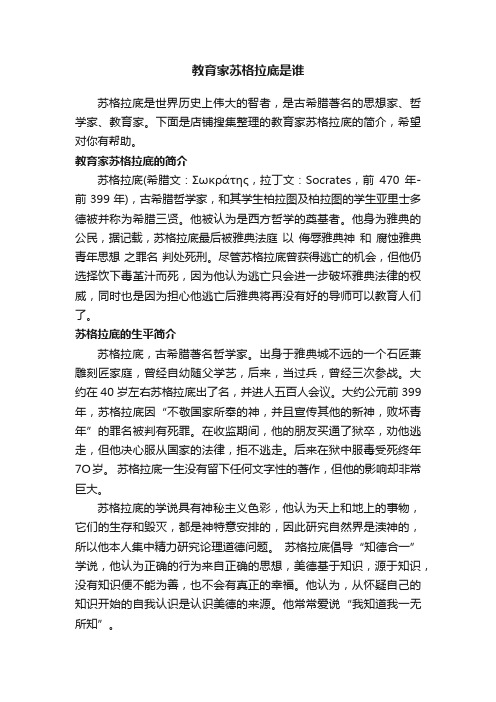
教育家苏格拉底是谁苏格拉底是世界历史上伟大的智者,是古希腊著名的思想家、哲学家、教育家。
下面是店铺搜集整理的教育家苏格拉底的简介,希望对你有帮助。
教育家苏格拉底的简介苏格拉底(希腊文:Σωκράτης,拉丁文:Socrates,前470年-前399年),古希腊哲学家,和其学生柏拉图及柏拉图的学生亚里士多德被并称为希腊三贤。
他被认为是西方哲学的奠基者。
他身为雅典的公民,据记载,苏格拉底最后被雅典法庭以侮辱雅典神和腐蚀雅典青年思想之罪名判处死刑。
尽管苏格拉底曾获得逃亡的机会,但他仍选择饮下毒堇汁而死,因为他认为逃亡只会进一步破坏雅典法律的权威,同时也是因为担心他逃亡后雅典将再没有好的导师可以教育人们了。
苏格拉底的生平简介苏格拉底,古希腊著名哲学家。
出身于雅典城不远的一个石匠兼雕刻匠家庭,曾经自幼随父学艺,后来,当过兵,曾经三次参战。
大约在40岁左右苏格拉底出了名,并进人五百人会议。
大约公元前399年,苏格拉底因“不敬国家所奉的神,并且宣传其他的新神,败坏青年”的罪名被判有死罪。
在收监期间,他的朋友买通了狱卒,劝他逃走,但他决心服从国家的法律,拒不逃走。
后来在狱中服毒受死终年7O岁。
苏格拉底一生没有留下任何文字性的著作,但他的影响却非常巨大。
苏格拉底的学说具有神秘主义色彩,他认为天上和地上的事物,它们的生存和毁灭,都是神特意安排的,因此研究自然界是渎神的,所以他本人集中精力研究论理道德问题。
苏格拉底倡导“知德合一”学说,他认为正确的行为来自正确的思想,美德基于知识,源于知识,没有知识便不能为善,也不会有真正的幸福。
他认为,从怀疑自己的知识开始的自我认识是认识美德的来源。
他常常爱说“我知道我一无所知”。
但是,在肯定理性认识的同时,他却否定感性认识的作用。
苏格拉底在研究学问上有他自己的新方法,他通过问答的形式使对方纠正、放弃原来的错误观念并帮助他产生新思想。
他善于从个别的东西中抽象出普遍的东西,他这种应用辩证方法证明真理的方法是具体的,具有一定的相对性,对欧洲的思想史有着极大的影响。
孔子和苏格拉底教育思想之比较
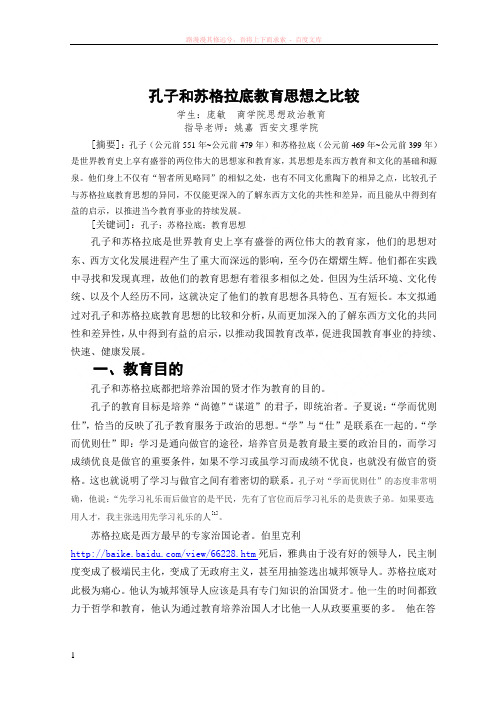
孔子和苏格拉底教育思想之比较学生:庞敏商学院思想政治教育指导老师:姚嘉西安文理学院[摘要]:孔子(公元前551年~公元前479年)和苏格拉底(公元前469年~公元前399年)是世界教育史上享有盛誉的两位伟大的思想家和教育家,其思想是东西方教育和文化的基础和源泉。
他们身上不仅有“智者所见略同”的相似之处,也有不同文化熏陶下的相异之点,比较孔子与苏格拉底教育思想的异同,不仅能更深入的了解东西方文化的共性和差异,而且能从中得到有益的启示,以推进当今教育事业的持续发展。
[关键词]:孔子;苏格拉底;教育思想孔子和苏格拉底是世界教育史上享有盛誉的两位伟大的教育家,他们的思想对东、西方文化发展进程产生了重大而深远的影响,至今仍在熠熠生辉。
他们都在实践中寻找和发现真理,故他们的教育思想有着很多相似之处。
但因为生活环境、文化传统、以及个人经历不同,这就决定了他们的教育思想各具特色、互有短长。
本文拟通过对孔子和苏格拉底教育思想的比较和分析,从而更加深入的了解东西方文化的共同性和差异性,从中得到有益的启示,以推动我国教育改革,促进我国教育事业的持续、快速、健康发展。
一、教育目的孔子和苏格拉底都把培养治国的贤才作为教育的目的。
孔子的教育目标是培养“尚德”“谋道”的君子,即统治者。
子夏说:“学而优则仕”,恰当的反映了孔子教育服务于政治的思想。
“学”与“仕”是联系在一起的。
“学而优则仕”即:学习是通向做官的途径,培养官员是教育最主要的政治目的,而学习成绩优良是做官的重要条件,如果不学习或虽学习而成绩不优良,也就没有做官的资格。
这也就说明了学习与做官之间有着密切的联系。
孔子对“学而优则仕”的态度非常明确,他说:“先学习礼乐而后做官的是平民,先有了官位而后学习礼乐的是贵族子弟。
如果要选用人才,我主张选用先学习礼乐的人[1]。
苏格拉底是西方最早的专家治国论者。
伯里克利/view/66228.htm死后,雅典由于没有好的领导人,民主制度变成了极端民主化,变成了无政府主义,甚至用抽签选出城邦领导人。
孔子和苏格拉底的教育思想
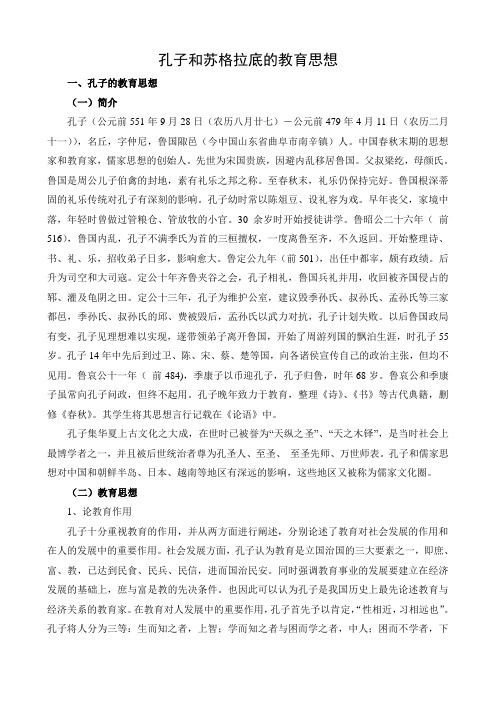
孔子和苏格拉底的教育思想一、孔子的教育思想(一)简介孔子(公元前551年9月28日(农历八月廿七)-公元前479年4月11日(农历二月十一)),名丘,字仲尼,鲁国陬邑(今中国山东省曲阜市南辛镇)人。
中国春秋末期的思想家和教育家,儒家思想的创始人。
先世为宋国贵族,因避内乱移居鲁国。
父叔梁纥,母颜氏。
鲁国是周公儿子伯禽的封地,素有礼乐之邦之称。
至春秋末,礼乐仍保持完好。
鲁国根深蒂固的礼乐传统对孔子有深刻的影响。
孔子幼时常以陈俎豆、设礼容为戏。
早年丧父,家境中落,年轻时曾做过管粮仓、管放牧的小官。
30余岁时开始授徒讲学。
鲁昭公二十六年(前516),鲁国内乱,孔子不满季氏为首的三桓擅权,一度离鲁至齐,不久返回。
开始整理诗、书、礼、乐,招收弟子日多,影响愈大。
鲁定公九年(前501),出任中都宰,颇有政绩。
后升为司空和大司寇。
定公十年齐鲁夹谷之会,孔子相礼,鲁国兵礼并用,收回被齐国侵占的郓、灌及龟阴之田。
定公十三年,孔子为维护公室,建议毁季孙氏、叔孙氏、孟孙氏等三家都邑,季孙氏、叔孙氏的邱、费被毁后,孟孙氏以武力对抗,孔子计划失败。
以后鲁国政局有变,孔子见理想难以实现,遂带领弟子离开鲁国,开始了周游列国的飘泊生涯,时孔子55岁。
孔子14年中先后到过卫、陈、宋、蔡、楚等国,向各诸侯宣传自己的政治主张,但均不见用。
鲁哀公十一年(前484),季康子以币迎孔子,孔子归鲁,时年68岁。
鲁哀公和季康子虽常向孔子问政,但终不起用。
孔子晚年致力于教育,整理《诗》、《书》等古代典籍,删修《春秋》。
其学生将其思想言行记载在《论语》中。
孔子集华夏上古文化之大成,在世时已被誉为“天纵之圣”、“天之木铎”,是当时社会上最博学者之一,并且被后世统治者尊为孔圣人、至圣、至圣先师、万世师表。
孔子和儒家思想对中国和朝鲜半岛、日本、越南等地区有深远的影响,这些地区又被称为儒家文化圈。
(二)教育思想1、论教育作用孔子十分重视教育的作用,并从两方面进行阐述,分别论述了教育对社会发展的作用和在人的发展中的重要作用。
关于道德修养的名人素材
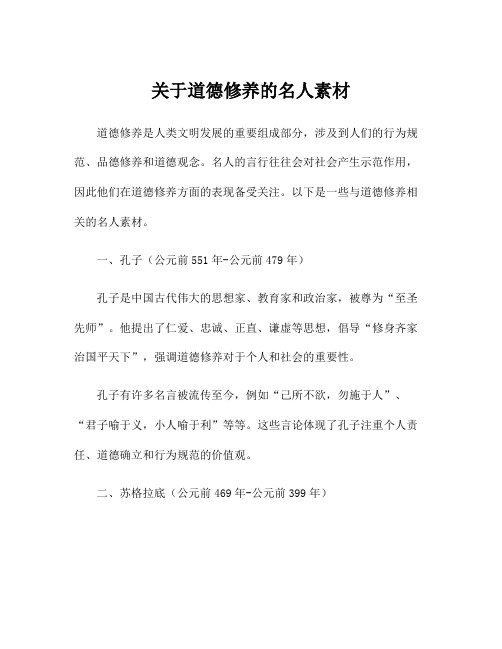
关于道德修养的名人素材道德修养是人类文明发展的重要组成部分,涉及到人们的行为规范、品德修养和道德观念。
名人的言行往往会对社会产生示范作用,因此他们在道德修养方面的表现备受关注。
以下是一些与道德修养相关的名人素材。
一、孔子(公元前551年-公元前479年)孔子是中国古代伟大的思想家、教育家和政治家,被尊为“至圣先师”。
他提出了仁爱、忠诚、正直、谦虚等思想,倡导“修身齐家治国平天下”,强调道德修养对于个人和社会的重要性。
孔子有许多名言被流传至今,例如“己所不欲,勿施于人”、“君子喻于义,小人喻于利”等等。
这些言论体现了孔子注重个人责任、道德确立和行为规范的价值观。
二、苏格拉底(公元前469年-公元前399年)苏格拉底是古希腊著名的哲学家和教育家,他是西方哲学的奠基人之一。
苏格拉底认为,真理和道德是息息相关的,他认为通过辩论和思考,人们可以建立起正确的道德观念和行为原则。
苏格拉底强调自律和自省,他认为一个人的内心需要清晰地认知和反思,才能形成正直和负责任的行为准则。
他主张追求智慧和真理,并将这种追求与道德规范联系在一起,认为真正的智者应该具备道德修养。
三、马克思(1818年-1883年)马克思是著名的德国哲学家、政治经济学家和社会活动家,他的思想为共产主义和社会主义的发展做出了重要贡献。
马克思倡导无产阶级的解放,反对剥削和压迫。
虽然马克思的信仰和思想导致了许多政治和社会冲突,但是他的追求社会正义和关注工人阶级权益的努力与道德修养密切相关。
马克思的追求是为了社会的公正和人类的解放,这种道德的价值观在他的思想体系中是非常明显的。
四、圣雄甘地(1869年-1948年)圣雄甘地是印度的国父和政治家,他带领印度人民争取独立,并提出了非暴力抵抗的理论和实践。
甘地强调平和、真实和公正,他主张非暴力和团结的方法来解决冲突和争议。
甘地的行为和言论都体现了对道德和品德的强调,他注重自律、忍耐和信仰。
他的教导强调了人类通过道德修养实现自我解放的重要性,强调了平和与协调的社会秩序。
孔子遇上苏格拉底的故事

孔子遇上苏格拉底的故事
孔子和苏格拉底都是古希腊文化和中国文化的代表人物,他们的故事被广泛传颂。
以下是一个关于他们相遇的故事:
有一天,孔子和他的弟子正在散步,突然他看到了一个老人在施肥。
孔子问他:“你在做什么?”老人回答说:“我在种植庄稼。
”孔子又问:“为什么要种植庄稼呢?”老人回答说:“因为我想生存。
”孔子非常钦佩老人的坦率和真诚,于是他说:“你说的话很有道理。
我们每个人都应该像你这样,真诚地追求自己的生存。
”
这时,苏格拉底走了过来,听到了他们的交谈。
苏格拉底是古希腊的哲学家和教育家,他对孔子的思想表示赞赏。
孔子也很高兴遇到苏格拉底,他认为他是一个具有高超智慧和深刻思想的人。
他们开始交谈,讨论了道德、伦理、智慧和人生的意义等问题。
苏格拉底告诉孔子,他认为智慧比财富和权力更为重要。
他告诉孔子,智慧是人类最高的追求,它可以让人们更好地理解自己和世界。
他还告诉孔子,智慧需要在实践中得到检验,只有通过不断地实践,人们才能获得真正的智慧。
孔子也表达了他的看法,他认为道德和伦理是非常重要的。
他告诉苏格拉底,他认为人类最重要的是要遵守道德规范,尊重他人,并为社会做出贡献。
他还告诉苏格拉底,他正在努力培养他的弟子,让他们成为有道德和伦理的人。
在这一次相遇中,孔子和苏格拉底互相交流了自己的思想,共同探讨了人类的本质和生命的意义。
这个故事告诉我们,即使是在古代,
中国和希腊也有着广泛的文化交流和对话,这些交流促进了人类的进步和发展。
苏格拉底与孔子
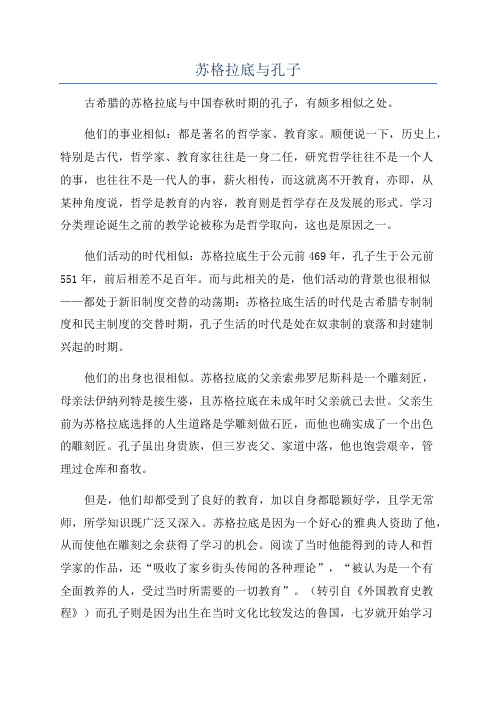
苏格拉底与孔子古希腊的苏格拉底与中国春秋时期的孔子,有颇多相似之处。
他们的事业相似:都是著名的哲学家、教育家。
顺便说一下,历史上,特别是古代,哲学家、教育家往往是一身二任,研究哲学往往不是一个人的事,也往往不是一代人的事,薪火相传,而这就离不开教育,亦即,从某种角度说,哲学是教育的内容,教育则是哲学存在及发展的形式。
学习分类理论诞生之前的教学论被称为是哲学取向,这也是原因之一。
他们活动的时代相似:苏格拉底生于公元前469年,孔子生于公元前551年,前后相差不足百年。
而与此相关的是,他们活动的背景也很相似——都处于新旧制度交替的动荡期:苏格拉底生活的时代是古希腊专制制度和民主制度的交替时期,孔子生活的时代是处在奴隶制的衰落和封建制兴起的时期。
他们的出身也很相似。
苏格拉底的父亲索弗罗尼斯科是一个雕刻匠,母亲法伊纳列特是接生婆,且苏格拉底在未成年时父亲就已去世。
父亲生前为苏格拉底选择的人生道路是学雕刻做石匠,而他也确实成了一个出色的雕刻匠。
孔子虽出身贵族,但三岁丧父、家道中落,他也饱尝艰辛,管理过仓库和畜牧。
但是,他们却都受到了良好的教育,加以自身都聪颖好学,且学无常师,所学知识既广泛又深入。
苏格拉底是因为一个好心的雅典人资助了他,从而使他在雕刻之余获得了学习的机会。
阅读了当时他能得到的诗人和哲学家的作品,还“吸收了家乡街头传闻的各种理论”,“被认为是一个有全面教养的人,受过当时所需要的一切教育”。
(转引自《外国教育史教程》)而孔子则是因为出生在当时文化比较发达的鲁国,七岁就开始学习礼、乐、御、数等知识,曾以郯子、苌弘、师襄、老聃等人为师。
儒家的经典“六经”与他有密切关系,《春秋》是他所作,其他的则是经过了他的整理。
可见他的知识广博精深的程度。
他的学生颜回就称他是“仰之弥高,钻之弥坚”,这不仅是称赞他人格的伟大,也在赞扬他拥有丰富的知识。
他们对知识都非常重视。
苏格拉底主张有知识的人才具有美德,强调“美德就是知识”。
柏拉图与孔子
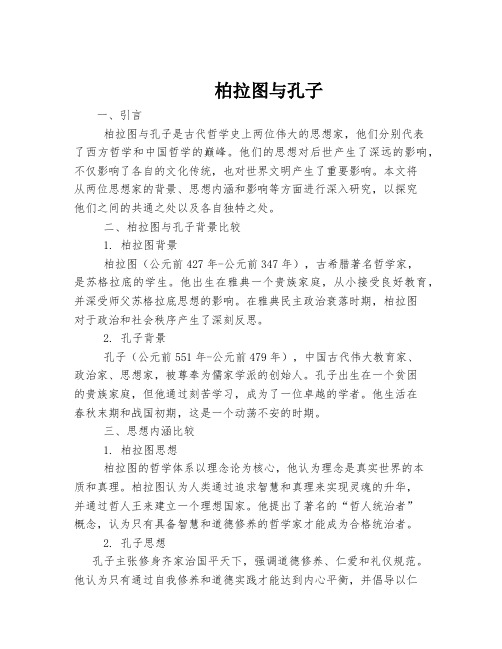
柏拉图与孔子一、引言柏拉图与孔子是古代哲学史上两位伟大的思想家,他们分别代表了西方哲学和中国哲学的巅峰。
他们的思想对后世产生了深远的影响,不仅影响了各自的文化传统,也对世界文明产生了重要影响。
本文将从两位思想家的背景、思想内涵和影响等方面进行深入研究,以探究他们之间的共通之处以及各自独特之处。
二、柏拉图与孔子背景比较1. 柏拉图背景柏拉图(公元前427年-公元前347年),古希腊著名哲学家,是苏格拉底的学生。
他出生在雅典一个贵族家庭,从小接受良好教育,并深受师父苏格拉底思想的影响。
在雅典民主政治衰落时期,柏拉图对于政治和社会秩序产生了深刻反思。
2. 孔子背景孔子(公元前551年-公元前479年),中国古代伟大教育家、政治家、思想家,被尊奉为儒家学派的创始人。
孔子出生在一个贫困的贵族家庭,但他通过刻苦学习,成为了一位卓越的学者。
他生活在春秋末期和战国初期,这是一个动荡不安的时期。
三、思想内涵比较1. 柏拉图思想柏拉图的哲学体系以理念论为核心,他认为理念是真实世界的本质和真理。
柏拉图认为人类通过追求智慧和真理来实现灵魂的升华,并通过哲人王来建立一个理想国家。
他提出了著名的“哲人统治者”概念,认为只有具备智慧和道德修养的哲学家才能成为合格统治者。
2. 孔子思想孔子主张修身齐家治国平天下,强调道德修养、仁爱和礼仪规范。
他认为只有通过自我修养和道德实践才能达到内心平衡,并倡导以仁爱之心对待他人。
孔子提出了“五常”(仁、义、礼、智、信)的概念,强调个人与社会的和谐与稳定。
四、柏拉图与孔子思想的共通之处1. 对人性的思考柏拉图和孔子都对人性进行了深入思考。
柏拉图认为人性是由灵魂构成,灵魂中包含了三个部分:理性、意志和欲望。
他认为理性是最高层次的部分,只有通过追求智慧才能实现灵魂的升华。
孔子也强调了道德修养对于个体和社会的重要性,他认为通过修身齐家治国平天下可以实现人性的完善。
2. 对社会秩序的关注柏拉图和孔子都关注社会秩序和政治问题。
苏格拉底 孔子

苏格拉底(公元前469—前399)和孔子(公元前551—前479)是处在同一时代的东西方先哲,二人在教育思想上有诸多的相似点。
在教育的对象上,二人都主张“有教无类”,推动了教育和文化的普及。
(将原本只属于贵族的教育无偿向平民开放)
在对教育作用的认识上,二人都高度肯定教育的重要价值,认为教育的目的是培养德才兼备的人才。
孔子——“性相近,习相远”。
由于后天环境不同,人与人之间的习性发生了重大差异,因此孔子非常重视后天教育的重要性。
圣君、贤臣、良民不是天生的,但可以通过教育培养出来。
苏格拉底——美德即知识。
他认为多数人的意见不一定是正确的,在判断是非善恶时应当受有专门知识的人的意见所支配,
在教育方法上,二人都注重启发式教学,鼓励受教育者独立思考,反对直接给出现成结论的灌输式教学。
“启发”一词源于孔子:“不愤不启,不悱不发,举一隅不以三隅反,则不复也。
苏格拉底的启发式教学方法——苏格拉底问答法”、“精神助产术”。
不同点:
孔子没落的贵族;苏格拉底平民
孔子主张克己复礼,造成一种贵族化政治。
苏格拉底是当时雅典民主政治的批判者,主张独立思考,主张平民化的政治
1孔子对个人的要求的终极不目的在于维护国家的统治利益,
苏格拉底重于个人修养
2方式上:孔子——广收门徒,苏格拉底——到处说教,孔子也存在四处说教,但是主要精力还是门徒似的教育
3内容上,孔子——说教不依赖神意,对神敬而远之,
苏格拉底——借神意阐释哲理。
苏格拉底

(四)教育内容 从培养德才兼备的治国者的教育目的出发,苏格拉底提出 了广博的教育内容。“在所有的事上,凡受到尊重和赞扬 的人都是那些知识最广博的人,而那些受人谴责和轻视的 人都是那些最无知的人”,他还说:“一个好的政治家的 首要条件是他要具备广博的知识,不仅有着关于善、美德 的知识,而且要对国家的情况了如指掌。只有这样,他才 能达到他所希望达到的目的,才能较容易的把城邦智力 好。”在教育过程中,苏格拉底除了教授政治、伦理、雄 辩术和处理公共事务与私人事务所必须的实用知识外,还 第一次将几何、天文、算术列为必学科目,学习这些知识 的目的不在于发展理论思维,而在于实用。如:学习天文 是为了根据天象分辨时间,学习算术是为了避免无意义的 劳动等。
(五)苏格拉底方要的贡献是他的产婆术教育方法。这种方法即诱导 方法,教师不事先给出结论,而是通过跟学生讨论逐渐引导学生得到正确 的认识。后来所谓的“启发教学法”即源于苏格拉底。这种方法包括四个 步骤:讥讽、助产术、归纳和定义。 讥讽:就对方发言不断提出追问,迫使对方自陷矛盾,无词以对,终于承 认自己的无知。 助产术:帮助对方得到自己问题的答案。 归纳:即从各种具体的事物中找到事物的共性、本质,通过对具体事物的 比较寻求“一般”。 定义:把个别事物归入一般概念中,得到关于事物的普遍概念。 亚里士多德曾高度评价过苏格拉底方法,他说:“有两样东西完全可以归 功于苏格拉底,这就是归纳法和一般定义。这两样东西都是科学的出发 点。”
(二)教育目的 苏格拉底认为教育的目的应该是培养治国人才 (能自觉运用知识,具有永恒不变的道德的治国 人才)。他是爱国者,对生育、教诲过自己的母 邦雅典感恩戴德,为雅典的安全英勇战斗,为雅 典祖先的丰功伟业感到自豪,严格遵守雅典的法 律。但他对用抽签办法挑选国家官员的传统一再 提出批评。苏格拉底是专家治国论者,他认为治 国者必须有德有才,深明事理,具有各种实际的 知识。
孔子与苏格拉底

孔子一、生平孔子(公元前551年9月28日~公元前479年4月11日,即农历八月廿七~农历二月十一),名丘,字仲尼,汉族,春秋时期鲁国陬邑(今山东曲阜市南辛镇)人,先祖为宋国(今河南商丘一带)贵族。
中国古代的大思想家和大教育家、政治家,儒家思想的创始人。
孔子集华夏上古文化之大成,在世时已被誉为“天纵之圣”、“天之木铎”,是当时社会上的最博学者之一,被后世统治者尊为孔圣人、至圣、至圣先师、万世师表,是“世界十大文化名人”之首。
孔子的儒家思想对中国、儒家文化及世界有深远的影响。
全中国各地都有孔庙祭祀孔子。
1.家庭身世:贵族出身孔子是商朝开国君主商汤的后代,商超的宗室。
武王伐纣建立周朝,为安抚商朝的贵族,封于亳,国号宋,即宋国,所以是殷商的贵族后裔。
2.从事教育3.在鲁从政鲁昭公二十年,齐景公出访鲁国时召见了孔子,与他讨论秦穆公称霸的问题,孔子由此结识了齐景公。
鲁昭公25年,鲁国发生内乱,鲁昭公被迫逃往齐国,孔子也离开鲁国,到了齐国,受到齐景公的赏识和厚待,甚至曾准备把尼溪一带的田地封给孔子,但被大夫晏婴阻。
鲁昭公27年,齐国的大夫想加害孔子,孔子听说后向齐景公求救,齐景公说:“吾老矣,弗能用也。
”孔子只好仓皇逃回鲁国。
当时的鲁国,政权实际掌握在大夫的家臣手中,被称为“陪臣执国政”,因此孔子虽有过两次从政机会,却都放弃了,直到鲁定公9年被任命为中都宰,此时孔子已51岁了。
孔子治理中都(今汶上县)一年,卓有政绩,被升为小司空,不久又升为大司寇,摄相事,鲁国大治。
鲁定公12年,孔子为削弱三桓(季孙氏、叔孙氏、孟孙氏三家世卿,因为是鲁桓公的三个儿子的后代,故称三桓,当时的鲁国政权实际掌握在他们手中,而三桓的一些家臣又在不同程度上控制着三桓,采取了隳(hui,音辉)三都的措施(即拆毁三桓所建城堡)。
后来隳三都的行动半途而废,孔子与三桓的矛盾也随之暴露。
鲁定公13年,齐国送80美女到鲁国,季孙氏接受了女乐,君臣迷恋歌舞,多日不理朝政,孔子非常失望,不久鲁国举行郊祭,祭祀后按惯例送祭肉给大夫们时并没有送给孔子,这表明季氏不想再任用他了,孔子在不得已的情况下离开鲁国,到外国去寻找出路,开始了周游列国的旅程,这一年,孔子55岁。
孔子和苏格拉底
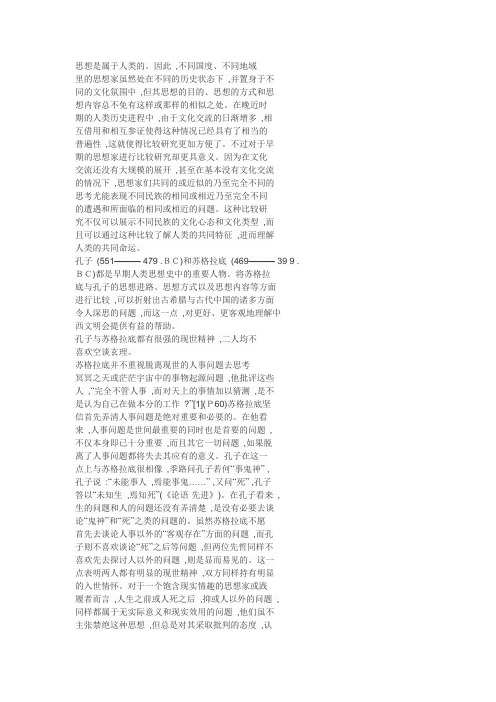
思想是属于人类的。
因此,不同国度、不同地域里的思想家虽然处在不同的历史状态下,并置身于不同的文化氛围中,但其思想的目的、思想的方式和思想内容总不免有这样或那样的相似之处。
在晚近时期的人类历史进程中,由于文化交流的日渐增多,相互借用和相互参证使得这种情况已经具有了相当的普遍性,这就使得比较研究更加方便了。
不过对于早期的思想家进行比较研究却更具意义。
因为在文化交流还没有大规模的展开,甚至在基本没有文化交流的情况下,思想家们共同的或近似的乃至完全不同的思考尤能表现不同民族的相同或相近乃至完全不同的遭遇和所面临的相同或相近的问题。
这种比较研究不仅可以展示不同民族的文化心态和文化类型,而且可以通过这种比较了解人类的共同特征,进而理解人类的共同命运。
孔子(551——— 479 .BC)和苏格拉底(469——— 39 9 . BC)都是早期人类思想史中的重要人物。
将苏格拉底与孔子的思想进路、思想方式以及思想内容等方面进行比较,可以折射出古希腊与古代中国的诸多方面令人深思的问题,而这一点,对更好、更客观地理解中西文明会提供有益的帮助。
孔子与苏格拉底都有很强的现世精神,二人均不喜欢空谈玄理。
苏格拉底并不重视脱离现世的人事问题去思考冥冥之天或茫茫宇宙中的事物起源问题,他批评这些人,“完全不管人事,而对天上的事情加以猜测,是不是认为自己在做本分的工作?”[1](P60)苏格拉底坚信首先弄清人事问题是绝对重要和必要的。
在他看来,人事问题是世间最重要的同时也是首要的问题,不仅本身即已十分重要,而且其它一切问题,如果脱离了人事问题都将失去其应有的意义。
孔子在这一点上与苏格拉底很相像,季路问孔子若何“事鬼神” ,孔子说:“未能事人,焉能事鬼……” ,又问“死” ,孔子答以“未知生,焉知死”(《论语·先进》)。
在孔子看来,生的问题和人的问题还没有弄清楚,是没有必要去谈论“鬼神”和“死”之类的问题的。
虽然苏格拉底不愿首先去谈论人事以外的“客观存在”方面的问题,而孔子则不喜欢谈论“死”之后等问题,但两位先哲同样不喜欢先去探讨人以外的问题,则是显而易见的。
西方的孔子-苏格拉底
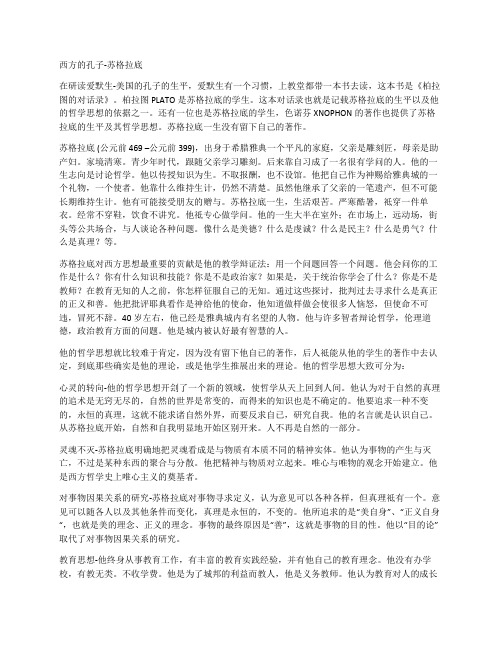
西方的孔子-苏格拉底在研读爱默生-美国的孔子的生平,爱默生有一个习惯,上教堂都带一本书去读,这本书是《柏拉图的对话录》。
柏拉图 PLATO是苏格拉底的学生。
这本对话录也就是记载苏格拉底的生平以及他的哲学思想的依据之一。
还有一位也是苏格拉底的学生,色诺芬XNOPHON的著作也提供了苏格拉底的生平及其哲学思想。
苏格拉底一生没有留下自己的著作。
苏格拉底 (公元前 469 –公元前399),出身于希腊雅典一个平凡的家庭,父亲是雕刻匠,母亲是助产妇。
家境清寒。
青少年时代,跟随父亲学习雕刻。
后来靠自习成了一名很有学问的人。
他的一生志向是讨论哲学。
他以传授知识为生。
不取报酬,也不设馆。
他把自己作为神赐给雅典城的一个礼物,一个使者。
他靠什么维持生计,仍然不清楚。
虽然他继承了父亲的一笔遗产,但不可能长期维持生计。
他有可能接受朋友的赠与。
苏格拉底一生,生活艰苦。
严寒酷暑,祗穿一件单衣。
经常不穿鞋,饮食不讲究。
他祗专心做学问。
他的一生大半在室外;在市场上,远动场,街头等公共场合,与人谈论各种问题。
像什么是美德?什么是虔诚?什么是民主?什么是勇气?什么是真理?等。
苏格拉底对西方思想最重要的贡献是他的教学辩证法:用一个问题回答一个问题。
他会问你的工作是什么?你有什么知识和技能?你是不是政治家?如果是,关于统治你学会了什么?你是不是教师?在教育无知的人之前,你怎样征服自己的无知。
通过这些探讨,批判过去寻求什么是真正的正义和善。
他把批评耶典看作是神给他的使命,他知道做样做会使很多人恼怒,但使命不可违,冒死不辞。
40岁左右,他己经是雅典城内有名望的人物。
他与许多智者辩论哲学,伦理道德,政治教育方面的问题。
他是城内被认好最有智慧的人。
他的哲学思想就比较难于肯定,因为没有留下他自已的著作,后人祗能从他的学生的著作中去认定,到底那些确实是他的理论,或是他学生推展出来的理论。
他的哲学思想大致可分为:心灵的转向-他的哲学思想开刽了一个新的领域,使哲学从天上回到人间。
- 1、下载文档前请自行甄别文档内容的完整性,平台不提供额外的编辑、内容补充、找答案等附加服务。
- 2、"仅部分预览"的文档,不可在线预览部分如存在完整性等问题,可反馈申请退款(可完整预览的文档不适用该条件!)。
- 3、如文档侵犯您的权益,请联系客服反馈,我们会尽快为您处理(人工客服工作时间:9:00-18:30)。
Similarly, Confucius although he tried to become politically effective, served mainly as an advisor and educator of politicians. However, his efforts in this area did make Confucius more involved in government than Socrates’ incidental(偶然的,附带的) services as a citizen.
Confucius and Socrates --- Life and Deeds Both Confucius and Socrates lived in cultures where hereditary(世袭的) privilege was the main factor in social status. Neither of them was extremely high-born, but they certainly were not peasants either. Confucius as one of the many lower aristocrats(贵族)was just high enough where he would be considered as a possible official in the government, but not enough that he was automatically given a position. Due to his economic circumstances, he spent some time working with his hands and in business.
Both men were attracted to the human culture of city life, although Confucius did travel around, while Socrates did not. They both were most interested in relating with people. We know very little about the younger years of either of them, by middle age they each had attracted a group of students around them. Socrates claims he never accepted money; but either he must have accepted minimal gifts to live on or he had an independent income, because he spent all his days in conversation.
Not having been in the highest class probably was a major factor in preventing an active and powerful political life. Socrates intentionally stayed out of politics due to his spiritual guidance, but did become an advisor and teacher to some who did engage in political leadership.
Confucius accepted gifts and had a group of regular students, but there is no indication that he used his teaching to become wealthy. In fact both of them were open to discussing ideas with any one who bothered to come to them. Both of them appeared to be inexhaustible(不知疲倦的)in their efforts to pursue wisdom; there is no record of anyone outlasting them in this persistence.
Neither Confucius nor Socrates would do something they considered to be unjust even if they were being intimidated(恫吓,威胁) by threats. Their actions were strictly regulated by their rational or intuitive (直觉的) evaluation of what was right. Confucius died a natural death at seventy-two, while Socrates was martyred(殉难,折磨)at seventy, but both accepted death calmly.
Perhaps the key event in both their lives was when they realized their divine mission(天职). Confucius said he was fifty when he knew the will of Heaven. Socrates does not say when the Delphic oracle(神谕, 圣言)made its famous pronouncement(声明) which stimulated his quest for a wise man, but it is likely that it was in his forties. In both cases, most of what we know about these two men occurred after this turning point in their lives.
Socrates was a citizen, but neither was he related to a ruling family. He probably worked as a stone-mason(泥瓦匠); he fought in battle not as an officer, but as a citizen soldier. Both apparently received an education as they became very familiar with the literature and music of their cultures. It is doubtful they could have become the educators they did, if they had not been born in circumstances where they could be educated.
Neither one seemed to have an especially significant teacher, but they both related to an ideal pattern, sometimes exemplified by the ancients. Their admiration for the classical writings of their cultures and their extensive knowledge of them indicates deep and prolonged study. Confucius spent some time playing music, and Socrates set some fables to music while in prison due to guidance from a dream.
This sense of their mission and divineappointed destiny must have strengthened their purpose considerably. Because of this relationship with the divine or a higher power, neither of them seemed to have any fear of death or anything else.
